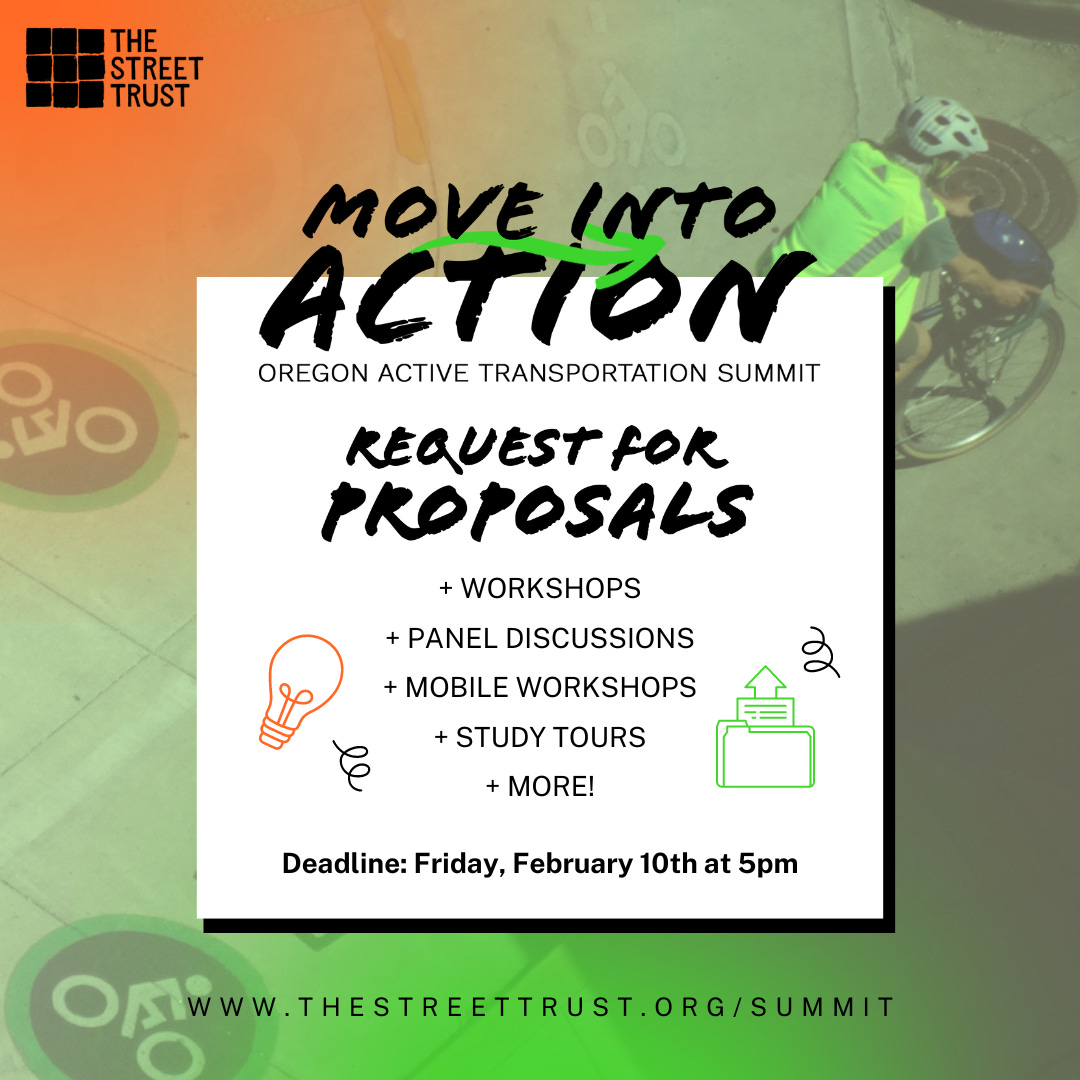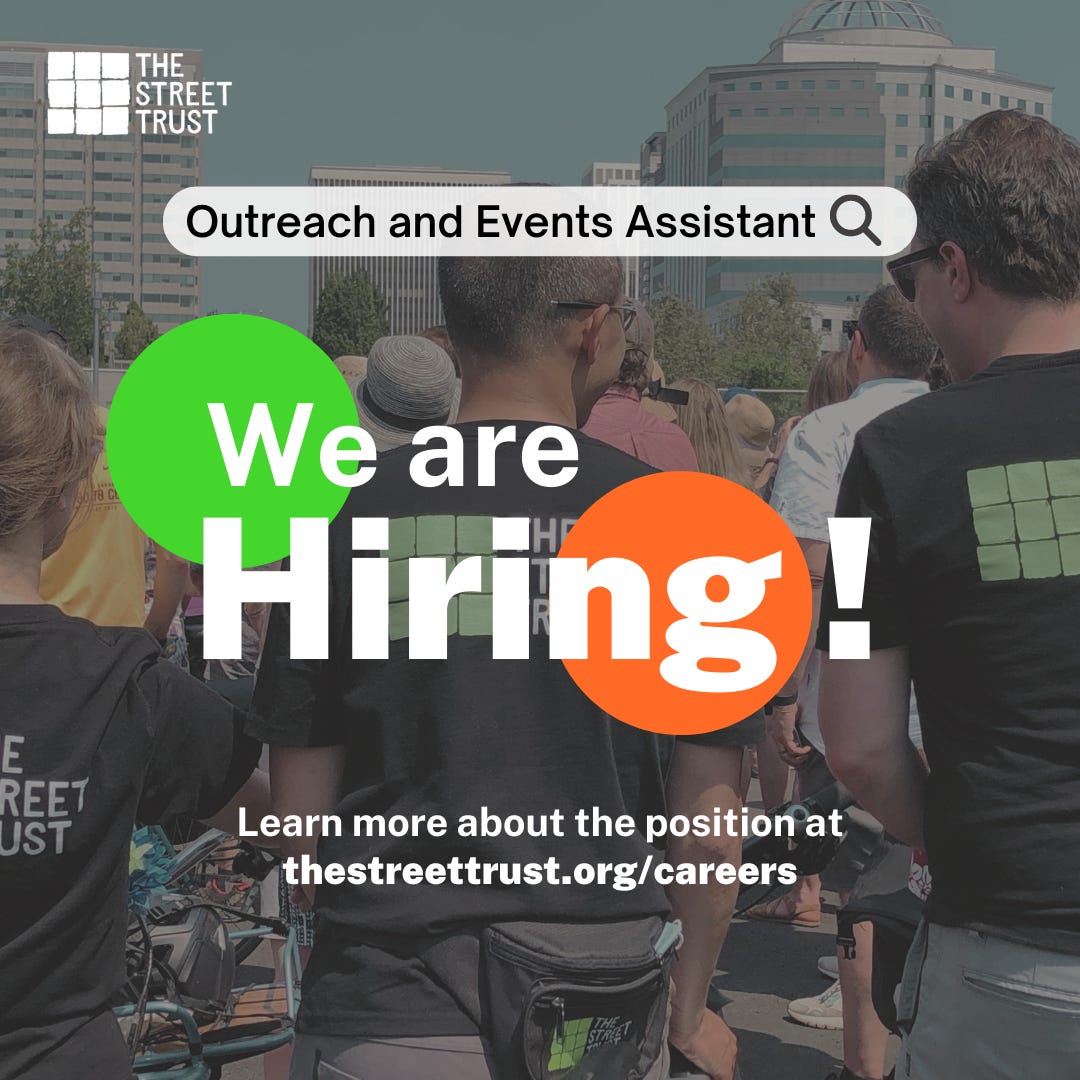Welcome to #OurStreets
The Street Trust newsletter has a new home and ambitious plans at Substack. #OurStreets will deliver community-focused, inclusive, fresh content, including guest authors and interviews.
Welcome to #OurStreets, a biweekly digest from The Street Trust. If you took the time to read our Year in Review Letter, you might have seen this coming. But we’re excited to announce again our new Substack publication and reader community.
Now, you can get The Street Trust to your inbox, the Substack app reader, and on the web—all with one subscription. If you're receiving this email, you are already a free subscriber. You will continue to get #OurStreets delivered — for free — in your inbox every other week.
Sometimes, we'll post a paragraph or two regarding an issue or event that occurs outside of our regular schedule. If you don’t want to miss these updates, we encourage you to create a Substack account. This will also give you the ability to engage with other subscribers in the comments and Chat.
We’re sending this inaugural issue of #OurStreets to a group of close contacts and TST members. We’d appreciate any feedback to communications@thestreettrust.org before we scale up our list. If you know someone who you think should be on the list, click “share” to let them know.
Word on the Street
A digest of top transportation stories and industry word soup.
Congestion Pricing
While often used interchangeably with tolling, the semantics of congestion pricing are important. Congestion pricing is intended to manage demand, charging higher prices during rush hours, or when road usage is high, to encourage commuting choices that reduce traffic and emissions.
According to the Federal Highway Administration:
“There is a consensus among economists that congestion pricing represents the single most viable and sustainable approach to reducing traffic congestion.”
A current proposal by ODOT is garnering criticism from many community and environmental groups who say it is NOT designed to produce these outcomes. Some raise equity concerns about raising prices without adequate safe and affordable alternatives. Others are concerned that ODOT’s planned spending to build new freeway capacity (I-5 Rose Quarter, I-5 Bridge) will effectively cancel out any alleged climate benefits of the project. Here’s what we had to say. [WW] [OPB]
The first phase of public comment for this closed last week, but there will be plenty more opportunities to weigh in and get involved.
Sign up now so you never miss an update or call to action regarding equitable mobility pricing.
I-5 at The Rose Quarter
Maybe you missed our letter to ODOT in 2019, asking them to conduct a full environmental impact analysis to determine the impacts and come up with solutions for people walking, rolling, and riding transit through the Rose Quarter (How did it get that name?). We hate to say, “told ya so” but they probably should have heeded the advice of ours and allied organizations seeking solutions to congestion through this area.
This week, as reported by WW, the Trailblazers came out against the current plan.
“Unfortunately, ODOT is rushing through a [design] that transfers a safety and traffic problem from I-5 to the Rose Quarter,” the organization wrote in its public comments.
“The proposed design does not improve on transportation safety over existing conditions and, in fact, creates more potential for conflict and risk between all modes. The increases in conflicts and risk raises the potential for injuries and deaths.”
We agree. Here’s what we submitted last week regarding the Rose Quarter project … and it includes the full text of our letter from 2019.
Traffic Violence
December 2022 saw a media blitz of stories on Portland’s pedestrian death rate, as it kept pace to break a 70-year record. It felt important to bring attention to the epidemic of traffic violence, even as brief as it was part of the “Year in Review” news cycle.
Looking back on the coverage, what stands out are the multiple, sometimes contradicting narratives from public officials about what is driving the increase–often citing external factors that feel out of their control. Attitudes towards pedestrians, cyclists and other road users, increasing population and homelessness, pedestrian distraction and disregard for road rules, speeding, and the list goes on…
Yet, there’s one factor that experts agree on, and the data supports: unsafe and incomplete streets, particularly “high-crash corridors.” This week, PBOT laid the groundwork for addressing this cause in 2023, stating they plan to “add more speed reductions in problem areas and [fight] for authority for the city to control speed limits.”[KOIN][WW][Oregonian]

Designated Speed Limits
In 2023, there will be a clearer path for Oregon cities, and Multnomah and Clackamas counties, to control speed limits on their own streets. A new law allows these jurisdictions to apply for full authority to set their own designated speed limit if a statutory speed limit (set by state law) is deemed inappropriate.
ODOT will still maintain a lot of control over the review process, and it will undoubtedly be onerous for smaller cities without an engineering department. In the City of Portland, where they've been lobbying for this autonomy for years, “PBOT has yet to identify specific streets or even high crash corridors in need of immediate speed limit changes.”
While this is a step in the right direction, we know that reducing speeds is just one part of the equation. State and local leaders should also redirect public dollars to invest in public transportation, and pedestrian and cyclist infrastructure; instead of road improvements that only benefit drivers.
Jurisdictional complexity can make coordinated action challenging, but the people walking, biking, rolling and taking transit on deadly stroads don’t care who controls them. They just want them to be made safer, quickly.[KGW][OPB]

E-Bikes
Our prediction? E-bikes will continue to make national headlines in 2023. One of the first NPR news stories we heard this year was about a new e-bike incentive program in Denver. The program offers residents up to $1,200 to put towards the purchase of an e-bike. Last spring, it proved so popular that all vouchers were claimed soon after they became available.
At the end of the pilot, recipients reported they had biked an average 26.2 miles per week, and replaced 3.4 car trips per week. These results have bike advocates excited about the possibility of e-bike incentives from the federal government.
“Why shouldn't there be the same kind of tax credits for e-bikes that there are for electric cars?” said Noa Banayan, director of federal affairs at People for Bikes.
PS. As “e-bike” becomes interchangeable with “bike,” what should we call non-electric bikes? Manual? Classic? Share your ideas in the comments!
#YourStreets
A spotlight on community creations, leadership, and fun in the streets.
New Years Day Ride
For over 50 years, Portland metro area residents have welcomed the new year with a bike ride. The ride serves multiple purposes: to joyfully welcome in the new year, celebrate improvements to our streets, and provide an opportunity to experience new parts of the region with friends old and new.
This year, we headed to Clackamas County to explore Milwaukie’s SAFE (Safe Access For Everyone) program innovations and investments. Our special guest was Mark Gamba, outgoing Mayor of Milwaukie and incoming State Representative (D- HD 41), who led on many of these investments.
What Can I Do?
If you can do one thing this week to reclaim streets for people, do this.
Send Us Your Pitch!
The Street Trust wants your pitch for a presentation or activity that will equip and mobilize decision makers, practitioners, advocates, community members, and youth to be active changemakers in bringing about a better transportation future. Accepted proposals will be a part of the 2023 Oregon Active Transportation Summit, Sunday, April 23rd through Wednesday, April 26th.
We value community-driven processes and solutions, and encourage applications from youth, grassroots advocates, and community groups whose primary focus may not be on active transportation. You are welcome to propose a presentation as an individual or in a group.
Click below for the full submission guidelines and how to submit your proposal.
Work with Us
The Street Trust is hiring an Outreach and Events Assistant to develop and execute public facing events across a variety of program areas. We’re looking for a caring, thoughtful individual who can efficiently, effectively connect with people from diverse backgrounds to better understand their needs and desires for our transportation and elevate their voices to decision-makers.
This is a part-time position of 20 hours per week, with an hourly pay rate of $20-25, depending on experience and/or multilingual proficiency.
Applications will be reviewed on a rolling basis until the position is filled, with a target start date of February 01, 2023.
Footnote: Never want to miss an opportunity from The Street Trust? Subscribe to TST Action Alerts and never miss our job and volunteer positions, RFPs and event announcements.
Thanks for reading #OurStreets!







